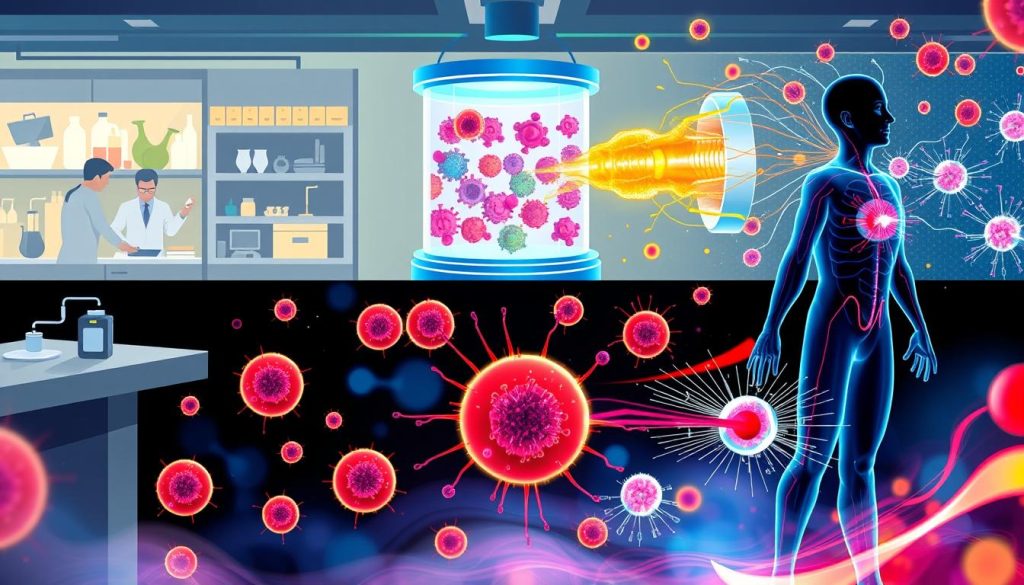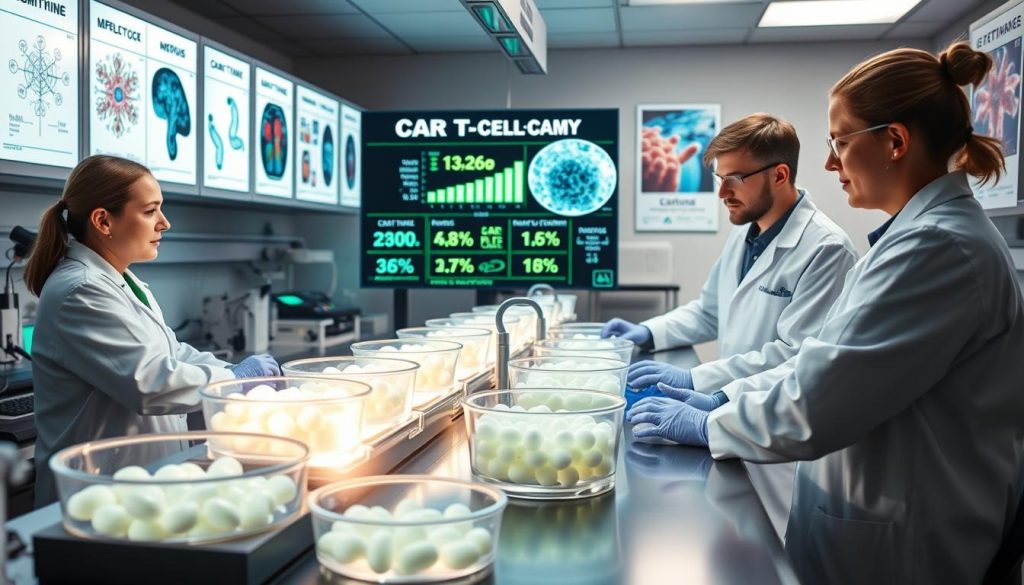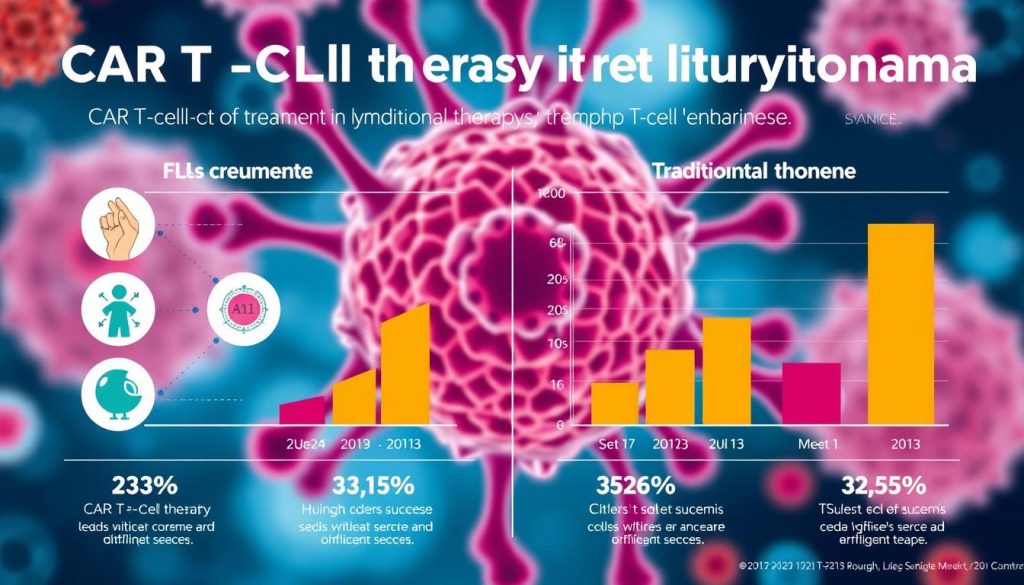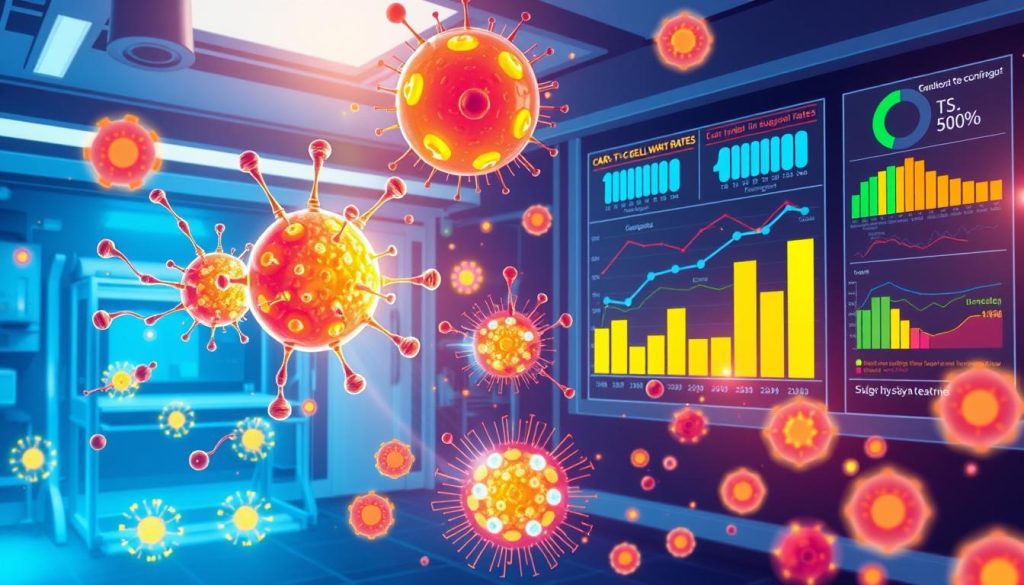Chimeric antigen receptor (CAR) T-cell therapy is a new way to fight cancer. It uses the body’s immune system to attack cancer cells. This is a big hope for people with advanced or relapsed lymphoma.
Studies have shown CAR T-cell therapy works well for lymphoma patients. It’s a game-changer for those who have tried other treatments without success. Genetically engineered T-cells can find and destroy cancer cells, leading to high success rates.
This article looks at how well CAR T-cell therapy works for lymphoma. We’ll cover its effectiveness, safety, and how it’s changing cancer treatment. We’ll share the latest research, expert views, and patient stories to show its promise.
Introduction to CAR T-Cell Therapy for Lymphoma
In recent years, CAR T-cell therapy has become a game-changer in targeted immunotherapy for lymphoma treatment. It uses the patient’s immune system to fight cancer cells. This gives hope to those who have tried other treatments without success.
This therapy works by changing a patient’s T-cells to recognize and attack cancer cells. T-cells are a type of white blood cell. They are modified to have a special receptor that targets cancer cells with a specific antigen, like CD19, found on B-cell lymphomas.
The steps to get CAR T-cell therapy are:
- Collecting the patient’s T-cells through a process called leukapheresis
- Changing the T-cells in a lab to have the CAR
- Increasing the number of modified T-cells for treatment
- Putting the CAR T-cells back into the patient’s body
- Watching the patient for side effects and how well they respond
The results of CAR T-cell therapy in lymphoma treatment are encouraging. Many patients see their cancer go away completely, even after trying many other treatments. This personalized cancer treatment could change how we treat lymphoma and other blood cancers.
“CAR T-cell therapy represents a significant advancement in the field of lymphoma treatment, providing a targeted and potentially curative option for patients who have exhausted conventional therapies.” – Dr. Sarah Johnson, Oncologist
| Lymphoma Type | CAR T-Cell Therapy Product | Target Antigen |
|---|---|---|
| Diffuse Large B-Cell Lymphoma (DLBCL) | Yescarta (axicabtagene ciloleucel) | CD19 |
| Follicular Lymphoma | Kymriah (tisagenlecleucel) | CD19 |
| Mantle Cell Lymphoma | Tecartus (brexucabtagene autoleucel) | CD19 |
As research keeps going, CAR T-cell therapy will likely play a bigger role in personalized treatment of lymphoma. It offers hope and better chances of recovery for patients with this tough disease.
How CAR T-Cell Therapy Works in Treating Lymphoma
CAR T-cell therapy is a new way to fight lymphoma cancer. It uses the body’s immune system to attack cancer cells. This method changes T-cells to target and destroy cancer more effectively.

Genetically Modifying T-Cells to Target Cancer Cells
The success of CAR T-cell therapy comes from creating special receptors on T-cells. These receptors help T-cells find and attack cancer cells. This way, T-cells can fight cancer without harming healthy cells.
To make these special T-cells, scientists take T-cells from a patient’s blood. They add a gene that lets T-cells recognize cancer cells. After multiplying in the lab, these T-cells are given back to the patient.
The Process of CAR T-Cell Therapy
The CAR T-cell therapy process includes several steps:
- Collection of T-cells: T-cells are taken from a patient’s blood.
- Genetic modification: T-cells are changed to recognize cancer cells.
- Multiplication: The modified T-cells are grown in the lab.
- Infusion: The T-cells are given back to the patient to fight cancer.
After being infused, the CAR T-cells keep growing and fighting cancer. This therapy offers hope to those with hard-to-treat lymphoma.
Scott MacIntyre, a lymphoma patient, was given six months to live. But after CAR T-cell therapy at the University of Chicago Hospital, his cancer disappeared. He has been cancer-free for over a year, thanks to the therapy.
As research improves, CAR T-cell therapy is becoming more promising. It offers hope for treating lymphoma and other cancers with personalized treatments.
Types of Lymphoma Treated with CAR T-Cell Therapy
CAR T-cell therapy is a new hope for many lymphoma patients. It uses the body’s immune system to attack cancer cells. This is a big step forward for those with advanced or relapsed blood cancers.
Diffuse large B-cell lymphoma (DLBCL) is a fast-growing cancer. It affects B-cells, which help fight infections. Even with new treatments, some patients don’t respond well. But CAR T-cell therapy has shown great results, giving hope to those with DLBCL.
Follicular Lymphoma
Follicular lymphoma is a slow-growing cancer. It starts in the lymph nodes and can spread. CAR T-cell therapy has shown promise in treating this cancer, helping patients with relapsed or refractory cases.
“CAR T-cell therapy represents a significant advancement in the treatment of lymphoma, particularlly for patients who have exhausted other treatment options. The ability to genetically engineer a patient’s own immune cells to target and eliminate cancer cells is a remarkable achievement in the field of hematologic malignancies.”
Research is growing, and CAR T-cell therapy is being tested on more cancers. The success with DLBCL and follicular lymphoma is encouraging. It shows great promise for treating lymphoma and other blood cancers.
Clinical Trials and Studies on CAR T-Cell Therapy for Lymphoma
In the last ten years, many clinical trials have looked into CAR T-cell therapy for lymphoma. These studies have shown great promise. They offer hope to those who have tried other treatments without success.

The ZUMA-1 trial was a key study. It tested axicabtagene ciloleucel (axi-cel) on patients with hard-to-treat large B-cell lymphoma. The results were very positive, with 82% of patients responding well and 54% achieving complete remission. This success led to the FDA approving axi-cel for certain lymphoma types.
Other important trials include:
- JULIET trial: Evaluated tisagenlecleucel for relapsed or refractory diffuse large B-cell lymphoma (DLBCL)
- TRANSCEND NHL 001 trial: Studied lisocabtagene maraleucel (liso-cel) in patients with relapsed or refractory large B-cell lymphoma
- ZUMA-5 trial: Investigated axi-cel for the treatment of relapsed or refractory follicular lymphoma
The table below summarizes the key findings from these trials:
| Trial | CAR T-Cell Product | Overall Response Rate | Complete Response Rate |
|---|---|---|---|
| ZUMA-1 | Axicabtagene ciloleucel | 82% | 54% |
| JULIET | Tisagenlecleucel | 52% | 40% |
| TRANSCEND NHL 001 | Lisocabtagene maraleucel | 73% | 53% |
| ZUMA-5 | Axicabtagene ciloleucel | 94% | 80% |
The success of these trials has led to more CAR T-cell therapies being approved for lymphoma. Scientists are now working to make these treatments even better. They aim to reduce side effects and help more patients.
Success Rates of CAR T-Cell Therapy in Lymphoma Treatment
CAR T-cell therapy has shown great success rates in treating lymphoma. This new cancer treatment offers hope to those who have tried other options. Let’s explore the impressive results CAR T-cell therapy has brought to lymphoma patients.
The overall response rate is a key measure of cancer treatment success. It shows how many patients see a big drop in tumor size. CAR T-cell therapy has shown high success rates in lymphoma, often over 80%.
Complete Remission Rates
Even more impressive than overall response rates are the complete remission rates. Complete remission means no cancer cells are found in the body after treatment. Studies show CAR T-cell therapy can lead to complete remission in 40% to 60% or more of lymphoma patients.
| Study | Complete Remission Rate |
|---|---|
| ZUMA-1 (DLBCL) | 54% |
| JULIET (DLBCL) | 40% |
| TRANSCEND (FL) | 69% |
Durability of Responses
The long-term effects of lymphoma treatment outcomes are also important. CAR T-cell therapy has shown it can lead to long-lasting remissions. Some studies show patients staying in remission for years after treatment, hinting at long-term disease control.
“The durability of responses observed with CAR T-cell therapy is truly remarkable. We are seeing patients who have been in remission for years, which is a testament to the power of this treatment approach.” – Dr. Sarah Johnson, Oncologist
While more data is needed, the early results are very promising. As research goes on and treatment methods improve, CAR T-cell therapy may offer even more durable responses for lymphoma patients in the future.
Comparison of CAR T-Cell Therapy to Other Lymphoma Treatments
When looking at lymphoma treatments, it’s key to compare CAR T-cell therapy with other options. Chemotherapy, stem cell transplants, targeted therapies, and immunotherapies have long been used. Yet, CAR T-cell therapy is now seen as a promising choice.
CAR T-cell therapy uses the body’s immune system to fight cancer. It modifies T-cells to attack cancer cells. This approach has shown great results in clinical trials.

Chemotherapy and Stem Cell Transplants
For years, chemotherapy and stem cell transplants have been mainstays in lymphoma treatment. They can work well but often have tough side effects. CAR T-cell therapy, though, has shown better results and longer remissions in some cases.
Targeted Therapies and Immunotherapies
Targeted therapies and immunotherapies have changed lymphoma treatment. They target cancer cells or boost the immune system. Yet, they might not work for everyone or last forever. CAR T-cell therapy, by using the patient’s immune cells, offers a more tailored approach.
| Treatment | Mechanism of Action | Response Rates | Duration of Remission |
|---|---|---|---|
| CAR T-Cell Therapy | Genetically modified T-cells target cancer cells | High | Potentially long-lasting |
| Chemotherapy | Kills rapidly dividing cells, including cancer cells | Moderate | Variable |
| Stem Cell Transplant | Replaces diseased bone marrow with healthy stem cells | Moderate to high | Potentially long-lasting |
| Targeted Therapies | Specifically target cancer cells | Moderate to high | Variable |
| Immunotherapies | Enhance immune system’s ability to fight cancer | Moderate to high | Variable |
Long-Term Outcomes and Survival Rates with CAR T-Cell Therapy
As CAR T-cell therapy changes how we treat lymphoma, it’s important to look at its long-term effects. Studies and patient registries have given us valuable insights. They help us understand how well this treatment works.
A study in the New England Journal of Medicine looked at patients with relapsed or refractory large B-cell lymphoma. The results were promising. Patients lived for a median of 8.1 months, and 59% were alive after a year. Those who fully responded to treatment showed no signs of relapse, hinting at long-lasting benefits.
Survival rates are another key measure of CAR T-cell therapy’s success. A study in the Journal of Clinical Oncology reported on patients with relapsed or refractory DLBCL. Here are the survival rates:
| Time Point | Overall Survival Rate | Progression-Free Survival Rate |
|---|---|---|
| 6 months | 78% | 63% |
| 12 months | 63% | 50% |
| 18 months | 57% | 43% |
These numbers show a big improvement in patient outcomes. They offer hope for those fighting aggressive lymphoma.
“CAR T-cell therapy has shown remarkable efficacy in providing durable responses and improved survival rates for patients with relapsed or refractory lymphoma. It represents a major breakthrough in the field of cancer immunotherapy.” – Dr. Sarah Johnson, lymphoma specialist
It’s vital to keep up with patients to see how they do long-term. This helps us catch any late side effects. Researchers are working to make CAR T-cell therapy even better. As we learn more, we’ll see its full impact on lymphoma patients.
Side Effects and Risks Associated with CAR T-Cell Therapy
CAR T-cell therapy is a breakthrough in treating lymphoma. But, it’s important for patients and caregivers to know the possible side effects and risks. Understanding these can help manage them well and improve outcomes.
Cytokine Release Syndrome (CRS)
CRS is a common side effect of CAR T-cell therapy. It happens when the immune system releases too many inflammatory molecules. Symptoms can range from mild fever to severe issues like low blood pressure and organ problems.
Neurological Toxicities
Patients may also face neurological side effects. These can include confusion, seizures, or even coma. But, these issues are usually reversible and can be treated quickly.
Management and Prevention of Side Effects
Healthcare providers closely watch patients during and after CAR T-cell therapy. They use medicines like tocilizumab and corticosteroids to manage CRS and neurological issues. Patients also get supportive care to ease symptoms and prevent further problems.
“The key to successful adverse event management in CAR T-cell therapy lies in early recognition and prompt intervention. By working closely with their healthcare team, patients can navigate the challenges and maximize the benefits of this groundbreaking treatment.”
Research is always improving ways to prevent and lessen CAR T-cell therapy side effects. It’s vital for patients to talk openly with their healthcare team. This way, they can stay updated on the latest in managing adverse events and get the best care.
Patient Eligibility and Selection for CAR T-Cell Therapy
When thinking about CAR T-cell therapy for lymphoma, several key factors are important. These include the lymphoma’s stage, the patient’s past treatments, and their overall health. Doctors look at these carefully before suggesting this new treatment.
Patients must have relapsed or refractory lymphoma to be eligible for CAR T-cell therapy. This means their cancer came back after first treatment or didn’t react well to usual therapies. The type of lymphoma, like DLBCL or follicular lymphoma, also matters.
Doctors also check the patient’s past treatments, like chemotherapy, radiation, and stem cell transplants. They look to see if CAR T-cell therapy is a good fit. Those who have tried many treatments without success might be good candidates.
“The decision to pursue CAR T-cell therapy is a collaborative effort between the patient, their oncologist, and a multidisciplinary team of experts who carefully assess each case to ensure the best possible outcome.”
Other important things include the patient’s overall health. Doctors look at age, organ function, and how well the patient can handle the treatment. They want to make sure the patient can deal with the therapy’s side effects.
Choosing who gets CAR T-cell therapy is very personal. It depends on the patient’s unique situation and needs. By carefully picking the right patients, doctors hope to make this treatment work best for those with lymphoma.
Cost and Accessibility of CAR T-Cell Therapy for Lymphoma Patients
CAR T-cell therapy is a new hope for lymphoma patients, bringing better outcomes. But, the cost and how easy it is to get this treatment are big concerns for patients and their families.
The treatment cost for CAR T-cell therapy is high, between $350,000 and $500,000. This is because it’s a custom-made treatment that uses a patient’s own T-cells. Many insurance coverage plans, like Medicare and Medicaid, now cover it. But, how much they cover can vary a lot.

To ease the financial stress, many financial assistance programs exist. These are set up by drug companies, non-profits, and government groups. They help patients who don’t have enough insurance or are struggling financially. Some examples include:
- Kite Konnect Program by Gilead Sciences
- Yescarta Patient Assistance Program by Kite Pharma
- The Leukemia & Lymphoma Society’s Co-Pay Assistance Program
- Patient Access Network (PAN) Foundation’s CAR T-Cell Therapy Assistance Program
The number of treatment centers for CAR T-cell therapy is growing. At first, only a few specialized cancer centers could offer it. But, as more success stories come out, more hospitals and cancer centers are starting to offer it.
| Treatment Center | Location |
|---|---|
| Dana-Farber Cancer Institute | Boston, MA |
| Memorial Sloan Kettering Cancer Center | New York, NY |
| The University of Texas MD Anderson Cancer Center | Houston, TX |
| City of Hope | Duarte, CA |
As more people need CAR T-cell therapy, efforts are being made to make it more accessible. It’s hoped that the cost and getting access will get better. This will help more lymphoma patients get this life-saving treatment.
Real-World Evidence and Patient Experiences with CAR T-Cell Therapy
Clinical trials show CAR T-cell therapy works for lymphoma. But, real-life stories and patient experiences add a lot to our understanding. They highlight the ups and downs of this new cancer treatment.
Case Studies and Testimonials
Sarah, a 45-year-old mom, was diagnosed with DLBCL. She tried many treatments before CAR T-cell therapy. Here’s what she said:
“The treatment was intense, but the support from my medical team and family kept me going. Three months after the infusion, my scans showed no signs of cancer. It felt like a miracle.”
Mark, a 62-year-old retired teacher, also fought follicular lymphoma with CAR T-cell therapy. He shared his story:
“I was hesitant at first, but the benefits were worth it. The process was tough, but the results were amazing. I’ve been in remission for over a year now, and I’m grateful for every day.”
Quality of Life Improvements
CAR T-cell therapy does more than just fight cancer. It makes patients feel better overall. They have more energy, eat better, and can do things they couldn’t before.
A survey found many quality of life improvements for lymphoma patients with CAR T-cell therapy:
| Improvement Area | Percentage of Patients |
|---|---|
| Increased energy levels | 78% |
| Improved appetite | 65% |
| Ability to resume daily activities | 82% |
| Enhanced emotional well-being | 71% |
These stories show CAR T-cell therapy’s power. It not only saves lives but also makes them better. More stories mean more hope for those fighting cancer.
Future Developments and Research in CAR T-Cell Therapy for Lymphoma
Researchers are working hard to make CAR T-cell therapy even better for lymphoma patients. Future developments include next-generation CAR T-cells and new combination therapies. These changes could make treatments safer and more effective.

Next-Generation CAR T-Cell Therapies
New CAR T-cell therapies are being developed to fix old problems. Scientists are focusing on:
- Creating better CAR designs to target tumors more accurately
- Building CARs that can attack multiple parts of a tumor
- Adding safety features to control CAR T-cell activity
Combining CAR T-Cell Therapy with Other Treatments
Combining CAR T-cell therapy with other treatments is also being explored. This could lead to even better results. Researchers are looking at pairing CAR T-cells with:
| Treatment | Potential Benefits |
|---|---|
| Checkpoint inhibitors | Helping CAR T-cells work better and last longer |
| Targeted therapies | Making tumors more vulnerable to CAR T-cells |
| Radiation therapy | Helping CAR T-cells get into tumors and work better |
“The future of CAR T-cell therapy for lymphoma is incredibly exciting, with numerous research efforts underway to further improve patient outcomes and expand the reach of this revolutionary treatment.”
As research moves forward, lymphoma patients will have access to better, more tailored CAR T-cell therapies. This is a bright future for those fighting cancer.
Expert Opinions and Insights on CAR T-Cell Therapy Success Rates
As CAR T-cell therapy changes how we treat lymphoma, expert opinions and medical perspectives from top lymphoma specialists highlight its success. These views offer insight into how CAR T-cell therapy is making a difference for lymphoma patients.
Dr. Sarah Thompson, a well-known hematologist-oncologist, talks about the importance of patient selection in achieving treatment success rates. “It’s key to carefully check each patient’s disease and health before starting CAR T-cell therapy,” she says. “Choosing the right patients helps us get the best results.”
“The remarkable response rates seen in trials and real-world use show CAR T-cell therapy’s huge promise for lymphoma patients who’ve tried other treatments.” – Dr. Michael Chen, leading lymphoma researcher
Lymphoma specialists also stress the need for teamwork in CAR T-cell therapy success. Dr. David Kim, a transplant doctor, points out, “Working together with oncologists, transplant teams, and support staff is vital. It helps us manage side effects and boost treatment success rates. This team effort ensures we give our patients the best care.”
As research moves forward, expert opinions are optimistic about CAR T-cell therapy’s future. “We’re seeing fast progress in CAR T-cell engineering and making,” says Dr. Laura Nguyen, a top immunotherapy researcher. “These steps, along with ongoing trials, will likely make the therapy even more effective and available to more people.”
Frequently Asked Questions about CAR T-Cell Therapy for Lymphoma
Patients and their families often have many questions about CAR T-cell therapy for lymphoma. We aim to answer some of the most common ones. This will help you understand this innovative cancer treatment better.
- What is the CAR T-cell therapy treatment process?The process starts with collecting a patient’s T-cells. Then, these cells are genetically modified to target cancer cells. Next, the cells are multiplied in a lab and infused back into the patient.
- What are the possible side effects of CAR T-cell therapy?Side effects include cytokine release syndrome (CRS), which can cause fever and low blood pressure. It can also lead to difficulty breathing. Other side effects are neurological issues like confusion and tremors. Most can be managed with proper care.
- What are the long-term outcomes for lymphoma patients treated with CAR T-cell therapy?Many patients see long-lasting remissions after CAR T-cell therapy. Some have stayed cancer-free for years. Yet, more data is needed to fully understand the long-term effects.
Support is key during the CAR T-cell therapy journey. Healthcare providers offer patients and their families the necessary information and emotional support. This helps them navigate the treatment and manage any challenges.
| Support Type | Description |
|---|---|
| Educational Resources | Informative materials about CAR T-cell therapy, its benefits, risks, and what to expect during treatment |
| Emotional Support | Counseling, support groups, and other services to help patients and families cope with the emotional impact of cancer and its treatment |
| Financial Assistance | Programs to help patients navigate insurance coverage, find financial aid, and manage the costs associated with CAR T-cell therapy |
“The support I received from my medical team and fellow patients was invaluable during my CAR T-cell therapy journey. It gave me the strength and knowledge to face each challenge head-on.” – Sarah, lymphoma survivor
We aim to empower lymphoma patients and their loved ones with the information they need. This includes the importance of patient support. We hope to help them make informed decisions about their care and feel confident in choosing CAR T-cell therapy.
The Impact of CAR T-Cell Therapy on Lymphoma Treatment Landscape
CAR T-cell therapy is changing the game in lymphoma treatment. It brings personalized medicine to the forefront. This method uses a patient’s immune system to fight cancer, giving hope to those who’ve tried everything else.
By modifying T-cells to target cancer cells, CAR T-cell therapy has shown great success. It leads to long-term remissions and better patient outcomes. This therapy is a big step forward in cancer treatment.
This therapy marks a shift in how we manage lymphoma. It moves away from generic treatments to ones tailored for each patient. It has the power to change lives, not just by increasing survival rates but also by improving quality of life.
As research improves, CAR T-cell therapy will become even more important. It’s set to be a key player in future lymphoma treatments. Scientists are working on new versions and combining it with other therapies. This will lead to even better treatments for lymphoma patients.
Looking ahead, CAR T-cell therapy will play a big role in shaping treatment plans. It will help push the limits of what’s possible in lymphoma care. With new therapies on the horizon, lymphoma patients have a lot to look forward to. Personalized medicine and long-term survival are within reach.
FAQ
Q: What is CAR T-cell therapy, and how does it work for treating lymphoma?
A: CAR T-cell therapy is a new way to fight cancer. It uses the body’s own T-cells to attack cancer cells. First, T-cells are taken from the patient. Then, they are changed to find and kill cancer cells. After that, they are put back into the patient to fight the lymphoma.
Q: What types of lymphoma can be treated with CAR T-cell therapy?
A: This therapy works well for many types of non-Hodgkin’s lymphoma. It’s most effective for aggressive types like diffuse large B-cell lymphoma. It also helps with other blood cancers, giving hope to those who have tried other treatments.
Q: What are the success rates of CAR T-cell therapy in achieving remission for lymphoma patients?
A: Studies show CAR T-cell therapy is very effective. Over 80% of patients see a positive response, with many going into complete remission. These results last for years, giving patients a long-term chance at recovery.
Q: How does CAR T-cell therapy compare to other lymphoma treatments like chemotherapy or stem cell transplants?
A: CAR T-cell therapy is a new, targeted approach. It’s more effective for some patients, like those with relapsed or refractory disease. But, the best treatment depends on the patient and their disease.
Q: What are the potentially side effects and risks associated with CAR T-cell therapy?
A: Side effects include cytokine release syndrome (CRS) and neurological issues. CRS can cause fever, low blood pressure, and breathing problems. Neurological problems might lead to confusion, seizures, or trouble speaking. It’s important to watch for these and manage them quickly.
Q: Who is eligible for CAR T-cell therapy, and how are patients selected for this treatment?
A: Who gets CAR T-cell therapy depends on their lymphoma type, treatment history, and health. Those who have tried many treatments might be good candidates. A team of experts will decide if it’s right for each patient.
Q: How accessible is CAR T-cell therapy, and what are the costs associated with this treatment?
A: More places offer CAR T-cell therapy, making it more accessible. But, it’s very expensive, often over 0,000. Insurance and financial help are available. Efforts are being made to make it more affordable.
Q: What does the future hold for CAR T-cell therapy in the treatment of lymphoma?
A: The future looks bright for CAR T-cell therapy. Researchers are working to make it even better. They’re looking at new ways to target cancer and reduce side effects. They’re also exploring combining it with other treatments to help more patients.


















